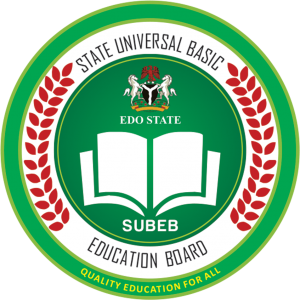Following the successful graduation ceremony of EdoBEST Induction trainees, the Executive Chairman of Edo State Universal Basic Education Board (Edo SUBEB), Mrs. Ozavize E. Salami has visited 16 schools to assess the state of infrastructure and level of compliance with the EdoBEST pedagogy.
The visits which covered selected Schools in Egor, Ovia North East, Oredo and Ikpoba Okha local government areas mark the beginning of a series of state-wide visits geared at giving Edo SUBEB first-hand insight into the state of Junior Secondary School (JSS) infrastructure and management with a view of improving the system.
In November 2021, the Edo State Ministry of Education brought JSS management and administration under the purview of Edo SUBEB as a major step in the JSS disarticulation process. Thereafter, a comprehensive baseline assessment was carried out to ascertain the level of competence of students in English, Mathematics and General Studies, ahead of wide-scale intervention by Edo SUBEB.
“Key to the JSS disarticulation process is the assessment of infrastructure which we have embarked upon. We want to manage classroom sizes to prevent congestion, also it is important that students are seated whilst taking classes and that their school spaces are safe havens for allow for effective learning and teaching.
“School Environment is one of our thematic pillars under EdoBEST 2.0 and as we consolidate on gains made in improving learning outcomes over the past four years of EdoBEST, it is now time for us to prioritise infrastructure at the primary level but more importantly at the JSS level as we incorporate the Junior Secondary Schools under the umbrella of our reforms, Mrs. Salami noted. Our infrastructure intervention will be structured and planned.
It was observed that the recently concluded induction training using the EdoBEST pedagogy is improving teaching and learning and is translating to more punctual and regular attendance in schools by teachers, more lively classrooms and more effective time and class management. The newly placed EdoSTAR teachers were seen present and working at their assigned schools. “These are still early days and teething problems are expected but we are fixing them as we go along and we project a balanced and fit-for-purpose system in the new term,” Mrs. Salami said.
In February 2022, a batch of 1,859 teachers and principals from Junior Secondary Schools across Edo state were given a comprehensive 10-day training to prepare them to deliver lessons and manage their schools using the EdoBEST pedagogy.
Most principals and teachers in the schools visited reported that their pupils are learning better while classrooms are being managed better. Students who were interviewed also expressed their preference for the new method of teaching and learning.

